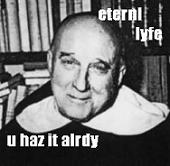‘This is worse than Mordor!’ said Sam. ‘Much worse in a way. It comes home to you, as they say; because it is home, and you remember it before it was all ruined.’
‘Yes, this is Mordor,’ said Frodo. ‘Just one of its works.’
Unless some enterprising army general turns up pretty soon, the Catholics in Ireland are going to have the experience of beings strangers in their own lands, as their brethren in England and Wales have done for so long. Many people have commented on the vote, and will comment. Of the things I have read, two in particular have struck me. The first is yesterday’s sermon from the Prior of Silverstream, of which this is a part:
Friday’s vote was not about abortion only; it was about killing Ireland’s soul, about snuffing out all that made Ireland a beacon among the nations, about publicly renouncing all that, from the time that Saint Patrick kindled his blazing fire on the Hill of Slane, made this island home of ours a great welcoming Catholic hearth in a world grown cold and dark.
The other was from Joseph Shaw, who observes among other things: “we are living in an integralist society, […] just not a Catholic one.”
But seeing the pictures of young women singing in the streets, I was reminded most of all of John Lamont’s important and difficult paper, ‘Conscience, Freedom, Rights: Idols of the Enlightenment’. He argues that the doctrines of conscience, human freedom, and rights, in the form in which they have become dominant in the last few hundred years, coalesce to what may truly be called a religion, which has the self as its object of worship. This explains, he argues, why the Enlightenment ideology has proved so successful in winning converts, despite the failure of its promises.
Its success rests on the fact that the Enlightenment offers a religious goal, in the form of an ultimate authority and good to be sought; that making the self that goal has a powerful appeal to human nature in its fallen state; and that the depth of sin involved in choosing this goal produces an extreme form of bondage and spiritual blindness which is very hard to break.
This goal has presented itself in different guises – as communism, Nazism or consumerism – but the fundamental concept and its appeal remains the same. It is the driving force behind the vulgar and base consumerism and sexual depravity that characterizes modern society. Previous non-Christian societies would have found these practices shameful and embarrassing. This natural human reaction is overridden, and even made use of, by the Enlightenment religion. This religion gives these forms of decadence a deeper meaning, the meaning of adoration of the deified self. The natural guilt and shame they provoke are transmuted into a proclamation of the self, which by rejecting the moral law is declaring its total supremacy.
The deep and sincere belief in the human right to have an abortion gets its strength from being the ultimate expression of the Enlightenment religion. It supporters understand that abortion is the murder of an innocent child, although they may not publicly proclaim this fact, or even consciously admit it to themselves. It is precisely its status as murder of the most innocent that makes abortion the triumph of the deified self as the ultimate end.



